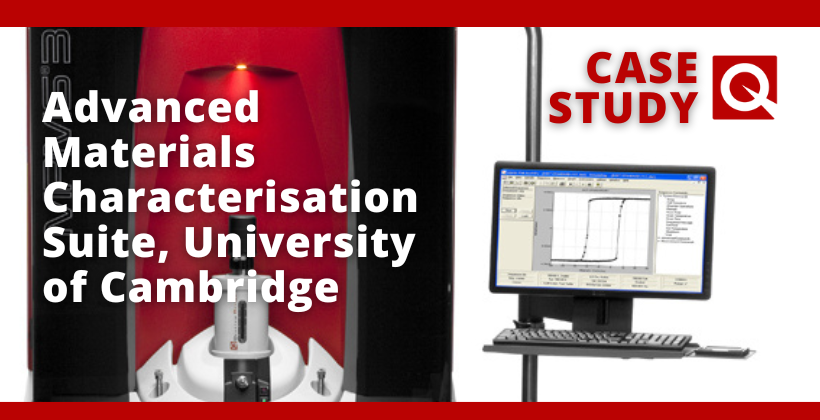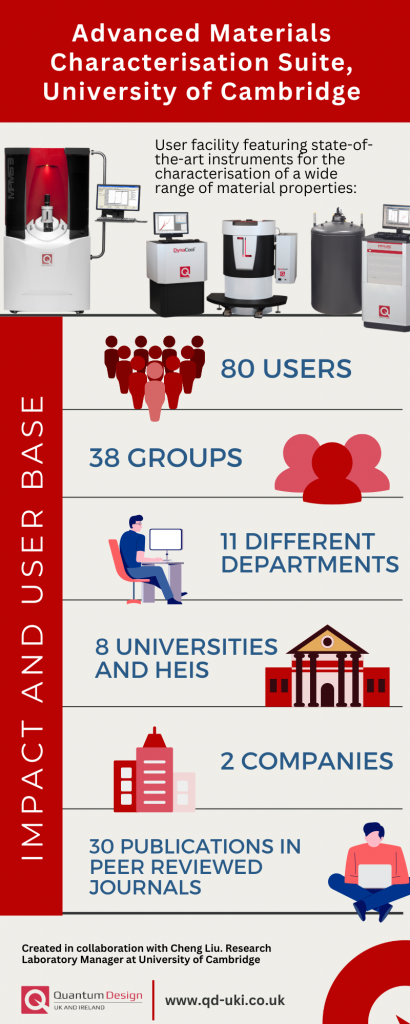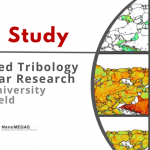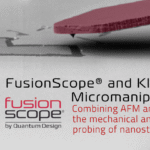
The Advanced Materials Characterisation Suite is a user facility for staff and students in the Cavendish Laboratory and other University of Cambridge departments. It is also open to users from other higher-education institutions and industrial partners.
Supporting Research
The user friendly and reliable systems serve very well as a user facility supporting research and development activities of both academic and industrial users. In the last two years alone, the instruments have supported research work of 80 users, from 38 research groups, 11 different academic departments, 8 universities and HEIs, and 2 companies. The research output resulted in over 30 publications in peer reviewed journals.
About the Systems Available in the Suite
The Suite is based in the Maxwell Centre, and has state-of-the-art instruments for the characterisation of a wide range of material properties.
MPMS3-Evercool
- Quantum Design MPMS3-EverCool
- With ETO, Oven, and AC options, and fibre-optic sample holder and high pressure cell
- Quantum Design MPMS3-EverCool
- With iQuantum helium-3 option
Quantum Design’s MPMS 3 represents the culmination of 40 years of development and design in the world of SQUID Magnetometry. Providing users with the sensitivity of a SQUID (Superconducting QUantum Interference Device) magnetometer and the choice of multiple measurement modes, the MPMS 3 offers new levels of performance in magnetic research while including those aspects of past Quantum Design SQUID magnetometers that customers have grown to appreciate and depend on.
Cryogen Free with EverCool®
The Electrical Transport Option (ETO) enables AC resistance measurements of samples using a 4-wire configuration. For samples with higher resistances, a 2-wire high impedance mode is also available. Signals from two channels can be collected simultaneously. An additional voltage pass through allows for voltage-controlled magnetism studies.
The iQuantum Helium-3 refrigerator extends the minimum temperature for DC and AC moment measurements below 0.5 K. The MPMS 3 Oven option allows sensitive magnetometry measurements at controlled temperatures from 315 K up to 1000 K
The AC Susceptibility option allows the experimenter to measure the dynamic (real and imaginary) response of a wide variety of samples including, but not limited to, superconductors, nanoparticles, and spin glasses.
The pressure cell option for magnetometry is manufactured by HMD, a leading Japanese supplier of pressure cells. A simplified design requires neither copper sealing rings or a hydraulic press to achieve the maximum available pressure of 1.3 GPa.
PPMS DynaCool
- Quantum Design PPMS DynaCool 14T
- With ETO, resistivity, horizontal rotator, torque magnetometry, heat capacity, helium-3, and ACMS II options
- Quantum Design PPMS DynaCool 9T
- With resistivity, heat capacity, helium-3, and ACMS II options
The PPMS DynaCool is Quantum Design’s next generation of Physical Property Measurement System. It is a completely redesigned instrument that provides all the capabilities of the PPMS without the need for any liquid cryogens. The system uses a single, two-stage pulse tube cryocooler for both the superconducting magnet and the temperature control system, providing an efficient, low vibration environment for sample measurements that simultaneously provides lower maintenance costs. The PPMS DynaCool comes equipped with either a 9 T, 12 T or 14 T conduction-cooled superconducting switch-less magnet system.
High-precision microcalorimetry experiments can be performed using the Heat Capacity option to measure a sample’s heat capacity as a function of temperature. Measurements in a static applied magnetic field are also possible using the automated field calibration function of the software.

DC transport for up to three channels on a standard puck can be measured using the DC Resistivity Option for the PPMS. Bridge channels can be individually configured for various levels of current excitation or power limitation, as well as enabling automated polarity-switch averaging to remove static DC offset voltages.
Customisation
The systems provide a very solid platform for developing further custom measurement hardware and software. We have developed special fibre-optic feedthroughs to enable photo-luminescence and photo-conductivity measurements on organic and perovskite samples in the PPMS-DynaCool. We have also developed custom probes to perform high sensitivity dielectric measurements, and anvil-type and piston-cylinder-type pressure cells for measurements in both the MPMS3 and PPMS-DynaCool.
SquidLab
The built-in background subtraction feature of the original MPMS MultiVu software was sorely missed in the new MPMS3. So, our users and facility manager teamed up with QD engineers and developed our own MatLab-based software, SquidLab1, to process the raw data, perform background subtraction, and carry out dipole moment fitting, to successfully extract sample magnetic signals 1/10 the size of the overall background signal.
Impact and user base
The results of the Advanced Materials Characterisation Suite between September 1, 2020 and August 31, 2022 are as follows:
- 80 users
- 38 groups
- 11 different departments
- 8 universities and HEIs
- 2 companies
- Over 30 publications in peer reviewed journals
List of publications:
- Low-Dimensional Metal–Organic Magnets as a Route toward the S = 2 Haldane Phase | Journal of the American Chemical Society (acs.org)
- Room Temperature Optically and Magnetically Active Edges in Phosphorene Nanoribbons | Research Square
- Valence bond glass state in the 4d1 fcc antiferromagnet Ba2LuMoO6 | npj Quantum Materials (nature.com)
- Free-Spin Dominated Magnetocaloric Effect in Dense Gd3+ Double Perovskites | Chemistry of Materials (acs.org)
- CO Meeting Organizer EGU22 (copernicus.org)
- Biomagnetic Characterization of Air Pollution Particulates in Lahore, Pakistan – Sheikh – 2022 – Geochemistry, Geophysics, Geosystems – Wiley Online Library
- Site-Selective d10/d0 Substitution in an S = 1/2 Spin Ladder Ba2CuTe1–xWxO6 (0 ≤ x ≤ 0.3) | Inorganic Chemistry (acs.org)
- f-electron hybridised Fermi surface in magnetic field-induced metallic YbB12 | npj Quantum Materials (nature.com)
- Biomagnetic characterisation of air pollution particulates in Lahore, Pakistan (essopenarchive.org)
- Impact of Orientational Glass Formation and Local Strain on Photo-Induced Halide Segregation in Hybrid Metal-Halide Perovskites | The Journal of Physical Chemistry C (acs.org)
- Unconventional quantum vortex matter state hosts quantum oscillations in the underdoped high-temperature cuprate superconductors | PNAS
- Phys. Rev. X 11, 011024 (2021) – Emergent Magnetic Phases in Pressure-Tuned van der Waals Antiferromagnet ${\mathrm{FePS}}_{3}$ (aps.org)
- Order–disorder, ferroelasticity and mobility of domain walls in multiferroic Cu–Cl boracite | IOPscience
- Magnetoelastic properties and behaviour of 4C pyrrhotite, Fe7S8, through the Besnus transition | IOPscience
- A general approach for hysteresis-free, operationally stable metal halide perovskite field-effect transistors | Science Advances
- Structure and magnetism of a new hexagonal polymorph of Ba3Tb(BO3)3 with a quasi-2D triangular lattice | ScienceDirect

To discuss QD Systems such as the MPMS3, PPMS and DynaCool, please contact our Technical Director, Dr. Shayz Ikram by email or call (01372) 378822.
Reference:
- SquidLab RSI publication: SquidLab—A user-friendly program for background subtraction and fitting of magnetization data: Review of Scientific Instruments: Vol 91, No 2 (scitation.org)
SquidLab software package: SquidLab – WRAP: Warwick Research Archive Portal







